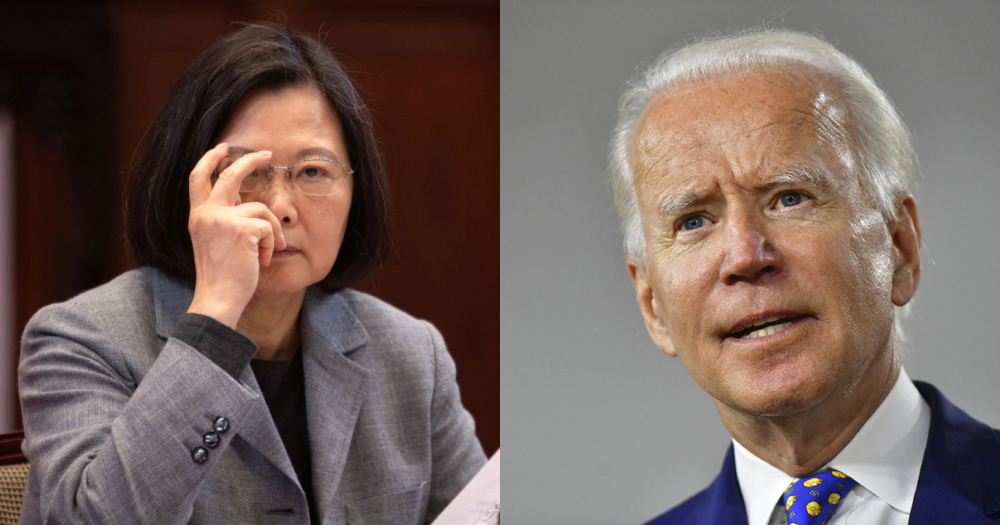Taiwan is gearing up to retain American support with the new incoming Biden administration.
Taiwan lobbying for the U.S. to continue cooperative relations
In virtual conferences with American think tanks, Taiwanese President Tsai Ing-wen is set to call on Washington to carry on working with Taipei to shift global supply chains away and counter security threats from China, two of her aides told Financial Times (FT).
Tsai's aide reportedly said she will remind her audience that both Taiwan and the U.S. share the values of "freedom and democracy", and stress that as the pandemic continues, cooperation is "more important than ever".
In addition, Tsai is expected to bring up China's military threats towards its neighbours, including Taiwan.
Lo Chih-cheng, a legislator from Taiwan's ruling Democratic Progressive Party who is also head of the U.S. caucus in legislature, told FT that Taiwan needs to "make its voice heard" in the upcoming China policy debate in the U.S.
FT further reported that Taipei has been lobbying U.S. lawmakers to ask Biden for his stance on continued cooperation with Taiwan.
In attempting to retain support from the U.S. to push back against perceived growing assertiveness from Beijing, Tsai was among the first leaders to congratulate Biden on winning the election.
Now it is my turn to extend congratulations to @JoeBiden & @KamalaHarris on being elected President & VP-elect. The values on which we have built our relationship could not be stronger. I look fwd to working together to further our friendship, & contributions to int’l society. https://t.co/xIvit7emjH
— 蔡英文 Tsai Ing-wen (@iingwen) November 8, 2020
Previously, Biden had congratulated her on her reelection in January.
Taiwan's ties with the U.S. strong under Trump
As Trump is set to be booted from the White House, many in Taiwan who favour a strong American approach to China have grown increasingly anxious as Biden prepares to take over.
Biden was part of the Obama administration which tried to prevent Taiwan from becoming a sticking point in relations with China.
Under Trump, U.S. relations with Taiwan had arguably been strengthened.
For instance, U.S. ships had sailed through the Taiwan Strait much more frequently during Trump's administration as compared to Obama's, who had cautioned against a shift in Taiwan policy as it could impact Washington's ties with Beijing significantly.
Trump's phone call with Tsai was also the first time an American leader had spoken directly to a Taiwanese leader since 1979 when formal relations with Beijing was established.
Furthermore, U.S. Secretary of Health and Human Services Alex Azar's August visit to Taiwan was the first one made by the highest-ranking U.S. government official in 41 years.
Growing anxiety among Taiwanese as they are unsure of Biden's China policy
In Taiwan, support for Trump was strong.
A poll of eight Asia-Pacific countries and regions has revealed that the self-ruled island was the only one rooting for Trump to win the election.
Compared to 42 per cent of Taiwanese respondents who favoured Trump over Biden, only 30 per cent of those surveyed backed Biden.
In contrast, as many as 66 per cent of Singaporean respondents said they support Biden over Trump.
Trump supporters from Taiwan told BBC Chinese that they believed Trump brought about a reversal to American foreign policy, which they say had been "weakened" under former U.S. President Barack Obama, who had also allowed Beijing to grow in its assertiveness.
But not all held the same views.
Some Biden supporters said the President-elect being one of the 90 senators who voted in favour of the 1979 Taiwan Relations Act means he is likely to keep up Washington's support for Taipei.
Biden himself has referenced the law several times.
Under the Taiwan Relations Act, the U.S. is obligated to regard any coercive moves by Beijing against Taiwan as a serious threat to the peace of East Asia, although it does not guarantee that the U.S. must come to Taiwan's defence militarily.
Biden supporters in Taiwan also cited an op-ed by Biden in World Journal, the largest Chinese-language newspaper in the U.S. -- published in the lead-up to the election -- which said he will "stand with friends and allies" to advance their "shared prosperity and values", including "deepening [American] ties with Taiwan, a leading democracy".
What will Biden's Taiwan policy look like?
With China-U.S. relations hitting their lowest point in decades, and bipartisan consensus in Washington on the need to take a tough stance against Beijing, Taipei might not have to be overly concerned about the U.S. losing interest in Taiwan.
Nevertheless, Biden is likely to be preoccupied with domestic challenges after taking office, such as controlling the spread of the Covid-19 pandemic, and is also less likely to take any dramatic measures that might provoke Beijing unnecessarily.
Totally unrelated but follow and listen to our podcast here
Top image by Ashley Pon/Bloomberg & Mark Makela via Getty Images
If you like what you read, follow us on Facebook, Instagram, Twitter and Telegram to get the latest updates.
